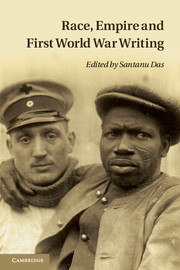Book contents
- Frontmatter
- Contents
- List of illustrations
- Acknowledgements
- Notes on contributors
- Introduction
- PART I VOICES AND EXPERIENCES
- 1 ‘An army of workers’: Chinese indentured labour in First World War France
- 2 Sacrifices, sex, race: Vietnamese experiences in the First World War
- 3 Indians at home, Mesopotamia and France, 1914–1918: towards an intimate history
- 4 ‘We don't want to die for nothing’: askari at war in German East Africa, 1914–1918
- 5 France's legacy to Demba Mboup? A Senegalese griot and his descendants remember his military service during the First World War
- PART II PERCEPTIONS AND PROXIMITIES
- PART III NATIONALISM, MEMORY AND LITERATURE
- Index
- References
1 - ‘An army of workers’: Chinese indentured labour in First World War France
Published online by Cambridge University Press: 05 February 2014
- Frontmatter
- Contents
- List of illustrations
- Acknowledgements
- Notes on contributors
- Introduction
- PART I VOICES AND EXPERIENCES
- 1 ‘An army of workers’: Chinese indentured labour in First World War France
- 2 Sacrifices, sex, race: Vietnamese experiences in the First World War
- 3 Indians at home, Mesopotamia and France, 1914–1918: towards an intimate history
- 4 ‘We don't want to die for nothing’: askari at war in German East Africa, 1914–1918
- 5 France's legacy to Demba Mboup? A Senegalese griot and his descendants remember his military service during the First World War
- PART II PERCEPTIONS AND PROXIMITIES
- PART III NATIONALISM, MEMORY AND LITERATURE
- Index
- References
Summary
In the autumn of 1919, as the victorious allies gathered in France for the Versailles Peace Conference to draw up the post-World War One settlement, they were joined by the little-noticed delegation from China. Having formally declared war on Germany in August 1917, China had earned the right to attend the conference – its presence symbolising, in effect, the first time in the modern era that the Western powers had acquiesced in China's membership of the international community. While his colleagues busied themselves preparing their negotiating positions, a member of the Chinese delegation – a legal counsellor employed by the Ministry of Internal Affairs – composed the words of a stirring song to commemorate the contribution China had made to the war:
Since leaving our motherland
we have crossed seas and mountains.
Whether metal, stone, earth or wood, we can work it,
the devastation of war we can repair.
We, the children of sacred China whose fate lies with heaven,
esteem the farmer and favour the artisan, but never resort to force.
Marching, marching, ever marching.
All within the four seas are brothers.
We are an army of workers devoting ourselves to labour
in order to build peace for you, humanity.
The ‘army of workers’ referred to by the Chinese counsellor were the nearly 140,000 Chinese contract labourers (mainly from the northern provinces of Shandong and Hebei) recruited by the British and French governments between 1916 and 1918 to make up for labour shortages in France, as well as to release British dockworkers in French ports for military duty.
- Type
- Chapter
- Information
- Race, Empire and First World War Writing , pp. 35 - 52Publisher: Cambridge University PressPrint publication year: 2011
References
- 6
- Cited by

